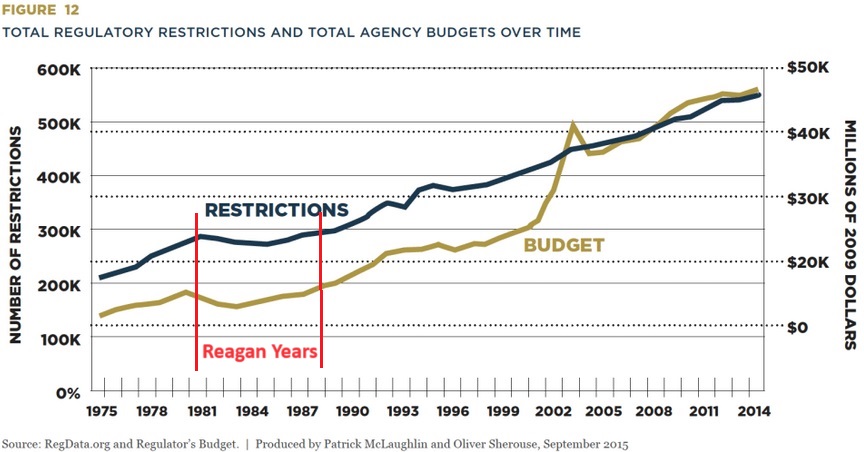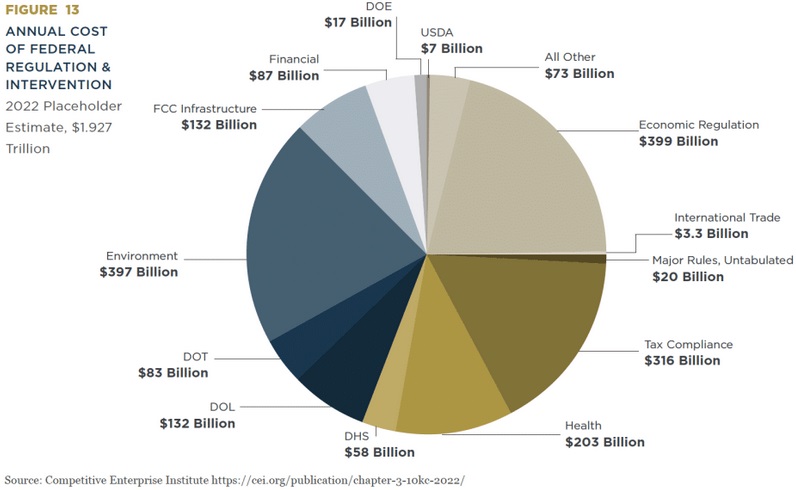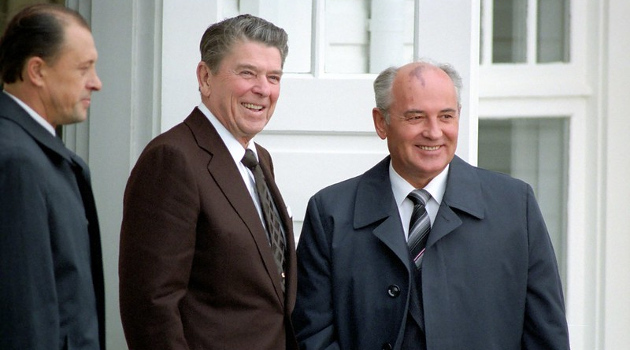This week is focusing on Reaganomics, both to learn what happened in the 1980s and to determine whether similar policies are needed today.
I’m citing a paper I wrote for the Club for Growth Foundation.
- In Part I, we reviewed Reagan’s successful record of spending restraint and explained why the same approach is needed today, particularly to control entitlements.
- In Part II, we examined Reagan’s much-needed supply-side tax reforms and said the same insights are needed today to address the problem of double taxation.
Today, in Part III, let’s look at Reagan’s record with regards to red tape.
This chart from the study summarizes Reagan’s biggest achievement. He was able to arrest the growth of both regulatory restrictions and regulatory spending during his eight years in office.

Here’s some of what I wrote in the study, including some recognition of some good policies enacted at the end of the Carter years.
The chart…captures the broader impact of Reagan’s presidency. You can see that both regulatory budgets and regulatory restrictions were rising before Reagan took office, were basically flat when he was in office, and then resumed rising after he left office… Incidentally, it should be noted that Reagan’s predecessor got the ball rolling on deregulation. Airlines, trucking, and rail were partially or fully deregulated during the Carter Administration. Those policies were very successful in lowering prices and increasing efficiency in the respective industries. Reagan’s appointees helped implement those good reforms.
That’s the good news.
The bad news is that subsequent presidents have not shared Reagan’s belief in competitive markets.
…there has been a regulatory tsunami since Reagan left office. There are now almost twice as many pages in the federal register as there were in the late 1980s. Meanwhile, regulatory budgets have tripled and regulatory restrictions have doubled since the end of the Reagan years.
Since regulatory policy covers so many areas, dealing with excessive red tape requires several reforms.
In the study, I listed some changes that would help.
- Require the elimination of a certain number of existing regulations before a bureaucracy can impose a new regulation.
- Insist that all regulations pass a cost-benefit test overseen by independent economists at the Office of Information and Regulatory Affairs.
- Enact a regulatory budget to limit the overall cost of red tape.
- Implement a competitiveness requirement so that regulation is never stricter than our foreign competitors with regards to so-called agreements like the Paris Climate Accord.
- Require stand-alone approval by both the House and Senate before any major regulation (costing $100 million and above) can be finalized.
- Adopt “mutual recognition” agreements with advanced allied nations so that Americans can access everything from baby formula to prescription drugs without waiting for bureaucratic approval in the U.S.
- Create a Regulatory Bill of Rights to give anyone investigated by a regulatory agency the same legal rights as accused criminals, as well as the right to recover damages if bureaucrats engage in abusive behavior.
I’ll close by sharing another chart from the study.
Here is the Competitive Enterprise Institute’s estimate of how much regulation is costing the U.S. economy.

So yes, there is a need for a renewed commitment to control red tape.
I’ll close with two observation.
First, regulation is akin to creating an obstacle course for workers and entrepreneurs. Second, Americans are more likely to recognize that there is a problem than people in other nations.
———
Image credit: The Official CTBTO Photostream | CC BY 2.0.


